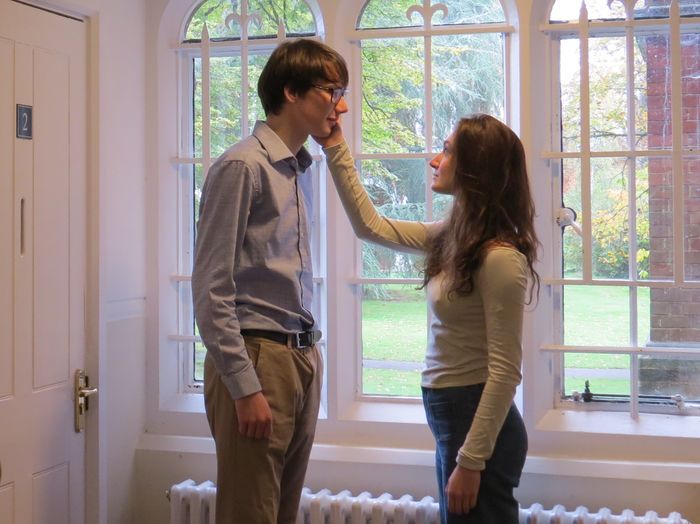The Hair Shop: A Black girls’ guide to detangling the white man’s world
An underwhelming attempt at asking some of the most pressing questions

Last night, I went to watch The Hair Shop - Akua Frimpong’s first directing credit. After the fantastic ‘A Raisin in the Sun’ earlier this term, I was excited to see another predominantly black cast and crew grace our Cambridge theatres. Directed and written by the second-year undergraduate herself, with the help of producer Aliyah York, I had a feeling of trepidation wondering ho The Hair Shop would tackle the questions posed in its advertisement. How would black femininity and all its qualms be encapsulated?
“How would black femininity and all its qualms be encapsulated?”
With the L-shaped studio at the Corpus Playroom, it is always a challenge to engage both rows of audiences. But Frimpong’s decision to ‘play the diagonal’ paid off. I was enthralled by the first scene where the girls queued diagonally in the Black owned hair shop Dukes. Paying homage to Cambridge’s very own Dukels (if you know, you know), the set was carefully crafted of walls teeming with black hair products. The endearing Auntie shopkeeper (Idara James) and the sight of hair extensions was nostalgic of long hours in the salon and ruminations in the hair shop with my own sisters and friends. Eager for more moments of magic, I was disappointed with the sloppy positionings which resulted in inaudible conversations since backs were turned to the audience. This was not aided by sound production since, despite the good music taste, it was too loud and overbearing at times.
Positioning continued to be a gripe through pertinent parts of the story - especially during the otherwise thought-provoking conversations between Emma (Ruthie Adeleke) and her mother (Akua Addo-Yobo). Time and time again, the two were obscured by poor lighting and were too far downstage left. I found this a great shame because Addo-Yobo was particularly impressive in her characterisation of a Ghanaian mother. The accent was sustained through all scenes and the tuts, shoulder shrugs and wry head shakes helped to indicate the hardships of her life. In this light (excuse the pun!), the difficulties of inter-generational difference within the Black diaspora were adequately addressed by Frimpong.
“A commendable attempt to navigate the trials and tribulations of Black British girls”
However, there were times when the script lacked attention to detail to appropriately deal with the intricacies of the politics of black beauty. Instead, discourse on colourism, texturism and workplace discrimination was limited. Additionally, the choice of humour to combat these elisions was then confusingly contrasted by gut-wrenching emotional performances. I was underwhelmed by this directorial decision since, for me, it diluted the intention of The Hair Shop. Nonetheless, special praise must be extended to Adeleke for her final monologue where she cries on cue; Ayeley Hudson’s (Chloe) breath-taking helplessness in a tender moment of struggle with her hair and finally, despite the humour being misplaced, I enjoyed Destiny Charles’ energy and pace as Hodan and her comedic timing was iconic.
The play was a commendable attempt to navigate the trials and tribulations of Black British girls with special instances of girlhood dispersed throughout- one of my favourite snapshots was Naomi (Kayden Best) and Bella (Aoife McGrath) getting ready for a party. An outspoken duo daubed in mellow pink feminine lighting, the two gossip about Naomi’s boyfriend Josh (Musharaff Adetunji) before (tangentially) touching on the adultification of Naomi as a child.
Bella’s ignorance and white privilege is clear. It is intentionally enhanced by the costume direction: a stereotypical ‘chav’ caricature, including foundation on her lips and audacious hoops. I also liked the coyish pairing of Ife (Noel Dawit) and Emma that was reminiscent of that awkward first teen date. Alas, the convoluted ending does not allow this relationship to develop much further.
“A play that lacked nuance, I struggled to detangle the tools needed to navigate the white man’s world”
A play that lacked nuance, I struggled to detangle the tools needed to “navigate the white man’s world as a black girl”. Nevertheless, immense credit must be given to Akua Frimpong and her co-directors (Wahida Seisay and Eyoel Abebaw). Attempting to address such mammoth issues within our black community, and situate it in Cambridge’s microcosm, is laudable. A continuous journey for us all, I look forward to seeing what Frimpong’s next endeavours are!
The Hairshop is showing at the Corpus Playroom from 21-25th November at 19:00
 Arts / Plays and playing truant: Stephen Fry’s Cambridge25 April 2025
Arts / Plays and playing truant: Stephen Fry’s Cambridge25 April 2025 News / Candidates clash over Chancellorship25 April 2025
News / Candidates clash over Chancellorship25 April 2025 Music / The pipes are calling: the life of a Cambridge Organ Scholar25 April 2025
Music / The pipes are calling: the life of a Cambridge Organ Scholar25 April 2025 Comment / Cambridge builds up the housing crisis25 April 2025
Comment / Cambridge builds up the housing crisis25 April 2025 Comment / Pick an exam format and stick to it25 April 2025
Comment / Pick an exam format and stick to it25 April 2025






